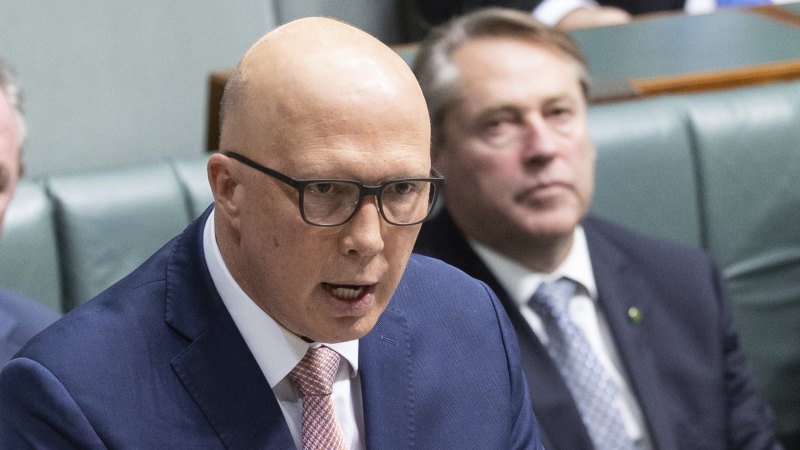Save articles for later
Add articles to your saved list and come back to them any time.
Opposition Leader Peter Dutton has unleashed a blistering assault on the Voice to parliament proposal, denouncing it as a regressive and radical threat to Australia’s democracy and one that would divide the country “in spirit and in law”.
As the parliament began debating the landmark piece of legislation that will authorise the Voice referendum, Dutton used his speech in the chamber to signal the attack lines that will form the basis of his campaign against the constitutional change, declaring it a “divisive, disrupting and democracy-altering Canberra-based Voice” that would “re-racialise our nation”.
Opposition Leader Peter Dutton speaking against the Constitutional Alteration bill to enshrine the Voice in the Constitution on Monday.Credit: Alex Ellinghausen
“It will have an Orwellian effect where all Australians are equal, but some Australians are more equal than others. If the Voice is embedded in our Constitution, there will be little to rejoice for when we sing the second line of our national anthem – ‘For we are one and free’.
“For instead of being ‘one’, we will be divided – in spirit, and in law,” Dutton said.
Indigenous Australians Minister Linda Burney repudiated Dutton’s characterisation, telling the chamber his speech was the embodiment of the scare campaigns that were seeking to derail the Yes campaign.
“We have just heard, in one speech, every bit of disinformation and misinformation and scare campaigns that exist in this debate,” Burney said.
Indigenous Australians Minister Linda Burney condemned Opposition Leader Peter Dutton’s speech as containing “every bit of disinformation and misinformation and scare campaigns that exist in this debate”.Credit: Alex Ellinghausen
Drawing on the precedent of the 1967 referendum, in which Australians voted overwhelmingly for constitutional change to allow the Commonwealth to make laws for Aboriginal people and include them in the census, Burney said the Voice referendum also was about fairness and hope for a better future.
“In 2023 it is time for recognition. It’s time for an Aboriginal and Torres Strait Islander Voice to the parliament because Aboriginal and Torres Strait Islander people have not enjoyed the same opportunities as so many other Australians,” Burney said.
She said the Voice would deliver structural change “that empowers Indigenous communities” and would ensure governments get “better advice so that we get better policies and better outcomes”.
She cited the legal advice of Solicitor-General Stephen Donaghue KC, who concluded the proposed constitutional amendment to enshrine the Voice would enhance Australia’s system of government, but she acknowledged this was “not enough for those hell-bent on dashing the hopes of a people”.
“It’s not enough for those trying to play politics with an issue that should be above partisan politics,” Burney said.
Dutton said the fact the Voice would be inserted into the Constitution via a new chapter “should set off alarm bells in the mind of every Australian”, describing it as the “most radical and consequential change to the way our democracy operates in our nation’s history”.
“If Australians have buyer’s remorse the Voice comes with a no-return policy. It’s here to stay in it. This institution hasn’t even been road tested.”
He also tapped into the long-running debate around the Voice’s capacity to advise executive government, which includes ministers and the public service, claiming the Voice could “grind our system to a halt from the resulting years of litigation”.
This assertion was also raised by a number of constitutional conservatives and legal experts during the six-week parliamentary inquiry into the Voice referendum, but was rejected by a larger cohort of eminent jurists, lawyers and academics who endorsed the proposed constitutional amendment to enshrine the Voice as legally sound.
Dutton said while the Coalition opposed the Voice it would not stand in the way of the bill’s passage, therefore allowing the referendum to proceed and the Australian people to have their say.
While the parliament was more polarised than ever on the issue on Monday, outside the chamber the Yes campaign added to its supporters list, with Cricket Australia becoming the latest major sporting code to back the Voice to parliament.
Cricket Australia chair Mike Baird, the former Liberal premier of NSW, said in a statement the board “supports the establishment of the Voice”.
“We encourage respectful and inclusive conversations across cricket to support our staff, players, volunteers and officials’ ongoing journey of education on First Nations histories and cultures and the proposal to formalise a lasting and appropriate voice for First Nations people through the referendum,” Baird said.
The AFL, NRL, Rugby Australia, and the National Basketball League have all announced their support for the proposed constitutional alteration, which will be put to Australians in a referendum by the end of 2023 with October 14 considered the most likely date.
Baird quit as NSW Premier in 2017 and is one of the most senior former Liberals in the country to have backed a Yes vote, albeit under the auspices of his position as Cricket Australia chair.
The decision to back the Voice places Baird directly at odds with Dutton but echoes former Liberal Premier Dominic Perrottet, who also backed the Voice.
Cut through the noise of federal politics with news, views and expert analysis from Jacqueline Maley. Subscribers can sign up to our weekly Inside Politics newsletter here.
Most Viewed in Politics
From our partners
Source: Read Full Article


